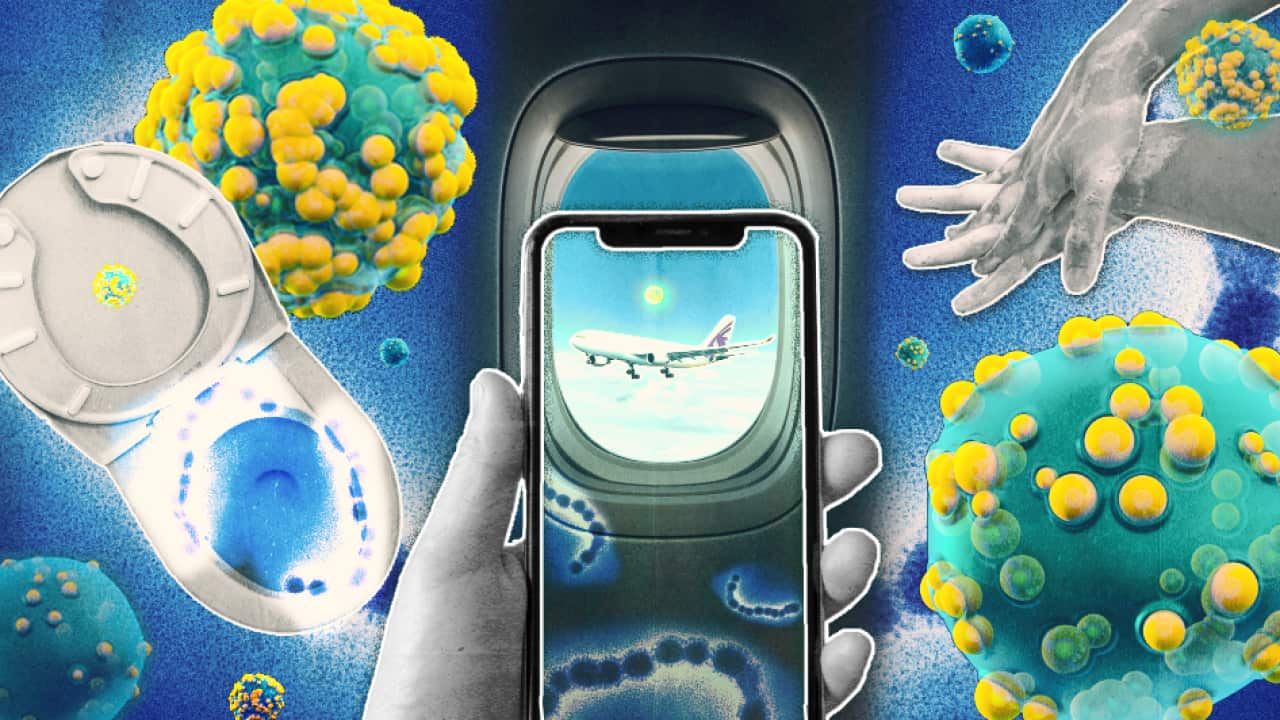Around 90 per cent of Australians own a mobile phone and there are about seven billion smartphones in the world, according to research by Deloitte.
On average Australians use their phones for around five hours per day for work, entertainment and communications, and this number has been rising.
It’s a worrying trend for scientists such as Dr Lotti Tajouri from Queensland’s Bond University.
“Mobile phones act as contaminated mobile petri dishes,” he said.
The molecular geneticist was part of a team that swabbed phones from international travellers who had flown into Sydney.
By extrapolating the results to account for 6.8 million arrivals into Australia between January and October 2023, the study’s authors estimate 749.2 million microbes may have been introduced to Australia in 2022 via mobile phones.
Not only can bacteria on phones be harmful to personal health, but they can also be a risk to flora and fauna when unknowingly brought into the country by travellers.
One example is a fungus called ‘Fusarium solani’, that has been linked to the shot hole borer, a tiny beetle that has been devastating trees in Western Australia for three years.
The borers have a symbiotic relationship with the fungi and can kill a tree in two years.
“Protecting our biodiversity and reducing the spread of superbugs is critical not only for the economy but for our national security,” Tajouri said.
“There is a clear argument to be made that international travellers’ phones should be decontaminated upon arrival to Australia, in addition to existing biosecurity measures.”
SBS News has contacted the Department of Agriculture, Fisheries and Forestry, which is responsible for biosecurity, for comment.
How dirty are our phones?
Phone screens can become dirty and contaminated for a number of reasons, including poor personal hygiene from people not washing their hands or sanitising after going to the bathroom.
This can be especially harmful when people scroll their phones while sitting on the toilet.
Studies have found widespread evidence of contaminated surfaces as a cause of faecal-oral transmission in public bathrooms.
Environmental scientist professor Erica Donner says a wide range of intestinal, skin, and soil bacteria and respiratory viruses were identified in public washrooms, posing risks of transmission.
“There is no doubt that thorough hand washing and effective hand drying is critical in stopping the spread of diseases,” she said.
“These habits will not only lower the risk of COVID-19 infection but also limit the risk of bacterial infections.”
Different attitudes towards hygiene
Personal hygiene habits play a large part in the transmission of bacteria and pathogens.
A study into the cleanliness of hospital bathrooms in the UK found the men’s bathrooms carried more bugs and superbugs than the women’s bathrooms.
Microbiologist Stephanie Dancer says hand hygiene surveys show that women are more likely to clean their hands after bathroom use than men.
“Our results appear to confirm what is generally thought in society: women clean because their perception of dirt and disgust entices action whereas men either don’t notice a dirty environment or don’t care. It follows that women are more likely to leave a bathroom clean while men assume someone will clean up after them,” she said.
Tips to keep your phone clean
The US Centers for Disease Control and Prevention has a list of ways to improve your phone hygiene.
- When outside of your home, keep your phone in your pocket, purse or car.
- When shopping, use a written shopping list, not a list kept on your smartphone.
- Use a credit card for payment, preferably a contactless one, and not the mobile pay option on your smartphone.
- After being in public places, only touch your phone after you have washed or sanitised your hands.
- Use a hands-free device when making calls so that your phone is not pressed against your face.
